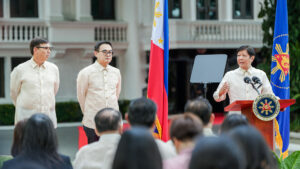




January Economic Update: Growth slows, prices rise
 DOWNLOAD
DOWNLOAD

Inflation Update: Up, up, and away?
 DOWNLOAD
DOWNLOAD

Quarterly Economic Growth Release: Growth takes on a slower pace
 DOWNLOAD
DOWNLOAD


PH to use nonmonetary tools to tame prices — Marcos

The Philippines will use nonmonetary measures including plugging supply gaps to stabilize prices this year, President Ferdinand R. Marcos, Jr. said on Friday after appointing a new Finance chief.
Finance Secretary Ralph G. Recto was ordered to “devise strategies that will tame inflation through a bastion of responses,” the President told a news briefing at the presidential palace, where the Finance chief took his oath.
Mr. Marcos said the government would stick to fiscal discipline under Mr. Recto, a former senator who pushed higher value-added taxes in the early 2000. He was serving as Batangas congressman before his appointment.
“When the seductive call of populism beckons, I am sure that Secretary Recto will counsel us on the merits of fiscal discipline, to remind us of the price tag of dreams and to stick to the kind of stewardship that bequeaths no huge generational debt for our children,” he said.
Runaway inflation forced global central banks to drive up interest rates to the fastest in decades last year, though the World Bank last month said prices are poised to continue easing in the coming months.
Philippine inflation averaged 6% last year compared with 5.8% a year earlier, marking the second straight year that the Bangko Sentral ng Pilipinas (BSP) breached its 2-4% target.
Mr. Marcos said he had also asked Mr. Recto to be at the forefront of the government’s anti-smuggling drive. The government would pursue tax cheats “starting with the habitual ones who have [turned] tax evasion not just into an art but into a business.”
Benjamin E. Diokno, Mr. Recto’s successor, would return to the BSP as a Monetary Board member after declining an appointment to the Philippines’ first sovereign wealth fund, the President said. Mr. Diokno was BSP governor for years under ex-President Rodrigo R. Duterte.
“The fiscal policies will remain the same,” the President said. “The fiscal discipline will remain the same. However, we are looking to see if there are any new ways to handle that.”
Mr. Recto should focus on further taming inflation while enforcing measures to increase household income and spending, said Terry L. Ridon, a public investment analyst and convenor of InfraWatch PH.
He said the new Finance chief should also strengthen private sector participation in the state’s flagship infrastructure projects.
Mr. Recto told the same briefing he would ensure that the government hits its revenue goal of P4.3 trillion this year. “You have a national development plan to fund. Incidentally, we will be borrowing P2.7 trillion next year.”
The Finance chief said the Marcos government would ensure that the Senate passes priority tax measures approved by the House of Representatives.
‘POLITICAL SKILLS’
Mr. Recto, the grandson of the late Filipino statesman Claro M. Recto, lost his Senate reelection bid in 2007 after pushing to raise value-added taxes by 2 points to 12%.
Then-President Gloria Macapagal-Arroyo appointed him director-general of the National Economic and Development Authority in 2008 but left a year later to prepare for his senatorial run in 2010. He served as a senator from 2010 to 2022.
“Ideologically, Secretary Recto will continue to pursue neoliberal programs by strengthening the role of markets and minimizing the regulatory role of the state,” Gary Ador Dionisio, dean of the De La Salle – College of Saint Benilde School of Diplomacy and Governance, said in a Facebook Messenger chat.
“He became NEDA secretary but he’s also a politician,” Foundation for Economic Freedom President Calixto V. Chikiamco said in a Viber message. “He needs to use his political skills to get critical fiscal measures passed by Congress.”
At the briefing, Mr. Marcos said El Niño and geopolitical risks could “trample” the optimistic growth outlook for the Philippines, which grew by 5.9% in the third quarter. “Abroad, escalating geopolitical tensions could dampen global trade, tighten global financing, as well as trigger fuel and food shocks that could tow inflation back up.”
“That is why we are watching it very, very closely,” he said. “There is the distinct possibility of the beginnings of El Niño starting now and extending until the end of the first quarter, or perhaps even extending into the second quarter.”
The Philippine leader called for timely interventions “so that food prices will not surge as a result of farm outputs falling short.”
“The question is whether this replacement is going to matter at all,” Leonardo A. Lanzona, who teaches economics at the Ateneo de Manila University, said via Messenger chat. “Unless there are significant and comprehensive reforms in the structure of the economy, none of these is going to matter.” — By Kyle Aristophere T. Atienza
This article originally appeared on bworldonline.com





 By BusinessWorld
By BusinessWorld